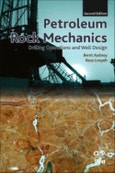Petroleum Rock Mechanics: Drilling Operations and Well Design, Second Edition, keeps petroleum and drilling engineers centrally focused on the basic fundamentals surrounding geomechanics, while also keeping them up-to-speed on the latest issues and practical problems. Updated with new chapters on operations surrounding shale oil, shale gas, and hydraulic fracturing, and with new sections on in-situ stress, drilling design of optimal mud weight, and wellbore instability analysis, this book is an ideal resource. By creating a link between theory with practical problems, this updated edition continues to provide the most recent research and fundamentals critical to today's drilling operations.
Please Note: This is an On Demand product, delivery may take up to 11 working days after payment has been received.
Table of Contents
Part 1: Fundamentals of Solid Mechanics 1. Stress/Strain Definitions and Components 2. Stress and Strain Transformation 3. Principal and Deviatoric Stresses and Strains 4. Theory of Elasticity 5. Failure Criteria
Part II: Petroleum Rock Mechanics 6. Introduction to Petroleum Rock Mechanics 7. Porous Rocks and Effective Stresses 8. In Situ Stress 9. Rock Strength and Rock Failure 10. Drilling Design and Selection of Optimal Mud Weight 11. Stresses Around a Wellbore 12. Wellbore Instability Analysis 13. Wellbore Instability Analysis Using Inversion Technique 14. Wellbore Instability Analysis Using Quantitative Risk Assessment 15. The Effect of Mud Losses on Wellbore Stability 16. Shale Oil, Shale Gas, and Hydraulic Fracturing
Appendix A. Mechanical Properties of Rocks B. The Poisson's Ratio Effect C. Model for the Stress Bridge D. Glossary of Terms
Authors
Bernt S. Aadnoy Professor of Petroleum Engineering, University of Stavanger, Norway. Bernt Sigve Aadn�y is a Professor of Petroleum Engineering at the University of Stavanger, specializing in all aspects of well engineering, including geomechanics. He is also an Adjunct Professor at NTNU-the Norwegian University of Science and Technology in Trondheim. He worked for major operators in the oil industry from 1978 until 1994, when he transitioned to academia. Aadn�y has published more than 300 papers, holds 15 patents, and has authored or co-authored seven books, among them Modern Well Design, Petroleum RockMechanics, and Mechanics of Drilling. He was also one of the editors of the SPE book Advanced Drilling and Well Technology (Society of Petroleum Engineers). Aadn�y holds a BS degree in mechanical engineering from the University of Wyoming, an MS in control engineering from the University of Texas, and a PhD in petroleum rock mechanics from the Norwegian Institute of Technology. He was a recipient of the 1999 SPE International Drilling Engineering Award and is also a 2015 SPE/AIME Honorary Member and a 2015 SPE Distinguished Member. He was named SPE Professional of the Year 2018 in Norway. Reza Looyeh Lead Engineer, Chevron Limited, Pembroke Refinery, UK. Reza Looyeh is a registered Chartered Engineer, a Fellow member of the Institute of Mechanical Engineeres (IMechE) in the UK, and a member of the American Society of Mechanical Engineers (ASME). He holds a BSc in Mechanical Engineering from Tehran University, Iran (1989, Honors Degree), an MSc from Newcastle University, UK, in offshore engineering (1994), and PhD from Durham University, UK, in mechanical engineering (1999). He is presently a lead mechanical engineer at Chebron Pembroke Refinery in the UK, a position he has held since 2006. Dr. Looyeh has over 25 technical publications on a variety of topics and is a member of the Engineering Equipment and Material User's Association (EEMUA), Piping Systems Committee (PSC), and Materails Technology Committee (MTC), as well as an industrial advisor to IMechE for the oil and gas sector.








